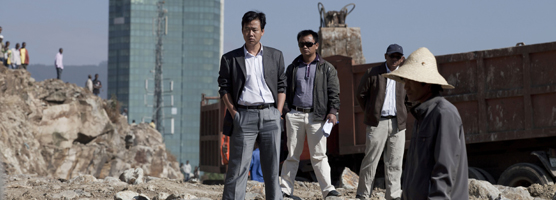Beyond China and Africa: Chinese and Western multinationals in Kenya

Text Maaike Siegerist
‘Competition for resources: Guns, oil and dirty deals – how China is pushing the West out of Africa,’ reads the title of a polemical article in the influential German news magazine Der Spiegel. Its author writes that, by doing business with African dictators, China is undermining Western embargoes and condemning African countries to poverty.
The article evoke a depressingly familiar imagery of Africa. 'So we take it for granted, but we shouldn’t,' says <link people ona-akemu>Ona Akemu, a PhD candidate who studies the social activities of a Chinese multinational in Kenya. ‘It is perhaps forgivable that the popular media portrays Africans as victims and the Chinese as ruthless exploiters of the continent,’ he says. ‘Sadly, however, these kinds of caricatures pop up in putatively serious academic literature as well. This I find extremely unconscionable.’
Underlying the dominant view of China in Africa are a number of assumptions. Akemu: ‘Number one: the West knows what’s best for Africa. But what is Africa? It’s a huge quilt of cultures and histories. Take an apparently unifying phenomenon – European colonisation. Even that was not uniform across Africa.’ British colonialism in his native Nigeria was more benign than it was in Kenya or Zimbabwe. On the other hand, Belgian rule in the Congo in turn was more brutal by far. ‘It means that this category we use, “Africa,” can be meaningless unless we explain why and how we use it,’ he says.
‘Second, what do we mean by “China”? Are we talking about Chinese private enterprises, Chinese SMEs, Chinese state-owned enterprises, the Chinese state? Those are very different actors with very different motives,’ Akemu argues. ‘To assume that all Chinese actors have a unitary goal is a prime example of lazy scholarship.’
We need to question the stock of characters that are presented to us whenever the subject of China in Africa is discussed. ‘Africans are always exploited; the exploiters are always the yellow men,’ says Akemu with irony in his voice. ‘And guess who the saviour is? It’s always Europe. When you see this in the media you need to question it. And I hope that international management scholars start to challenge these simplistic, sometimes racist depictions of complex peoples like Chinese and Africans.’
‘Don’t get me wrong: I’m not saying Chinese companies, or Chinese actors, are the new saviours in Africa,’ emphasises the PhD researcher. ‘Such a statement assumes Africans are looking for saviours. On the contrary, I think many African governments can — in some cases with outside help — solve their own problems. If Chinese investments in infrastructure and resources can help them, by all means, African governments should seize the opportunity’.
Western and Chinese social policies in Kenya
 For his PhD research, Akemu is studying the social initiatives of one Chinese multinational and one Western multinational in Kenya. ‘Social initiatives are acts that a company undertakesthat do not necessarily benefit the company directly,’ he explains. ‘More importantly: they benefit people external to the company.’ Comparing the social initiatives of two telecommunication giants, Akemu can already share some of his preliminary results.
For his PhD research, Akemu is studying the social initiatives of one Chinese multinational and one Western multinational in Kenya. ‘Social initiatives are acts that a company undertakesthat do not necessarily benefit the company directly,’ he explains. ‘More importantly: they benefit people external to the company.’ Comparing the social initiatives of two telecommunication giants, Akemu can already share some of his preliminary results.
Training versus charity
‘Whereas the Chinese company emphasises training and employing local people, the Western company emphasises charity in the form of providing tools and sending in experts,’ Akemu finds. Ericsson’s Millennium Villages are an interesting example of corporate social action by a Western company. In partnership with the Earth institute at Columbia University, the company helps model villages across eleven African countries to meet the Millennium Development Goals. The Chinese are doing something entirely different. Akemu: ‘They’re not talking in terms of Millennium Goals; they’re talking in terms of very near-term benefits for the recipients.’
The ‘right thing’ versus strategy
Another difference between the companies is the language they use. According to Akemu, the Western company wraps its social initiatives in normative terms: ‘They say “We’re doing this good deed because we believe it’s the right thing to do; because people in that local community have the right to telecommunication.” The Chinese company, on the other hand, neither talks about rights nor uses normative terms, the researcher finds. They talk about social initiatives as part of their core strategy and describe their social actions as closely aligned to their business. For example, by supporting education, they aim to develop local customers, improve their brand and, by implication, perform better in the local market. ‘It could be about image building,’ Akemu speculates. ‘But image building does not necessarily mean that there’s no substance behind the image.’
New kid on the block
Akemu visited Kenya a few weeks ago. He recounts: ‘When I was there, I consistently heard about Kenya’s “Go East” policy.’ According to this policy begun under Kenya’s former president, Mwai Kibaki, the Kenyan government is re-orienting its foreign policy eastwards – Kenya is deliberately courting countries like China, India and Malaysia for foreign investment in infrastructure and in its burgeoning mining sector. ‘This is a seismic shift,’ Akemu notes. ‘Historically, there was only one player in town: the West, especially the UK and the US. Kenya had to go to the West to seek foreign investment and development aid. Apparently, that model has not worked for them. The Kenyans I spoke with said, “Now there’s another kid on the block: China. Why not talk to them?”’
One way in which the Chinese government deals with African countries is by providing concessional loans. The recipient governments use those loans to pay for roads, provided by Chinese companies. ‘On the face of it, everyone benefits,’ says Akemu. ‘the African country gets a tangible benefit – a road, Chinese companies get work, and in some cases there’s a commitment to supply natural resources to China. That’s the sort of creative mechanism the Chinese are thinking up and using. Who says it’s illegal?’
Kenya appears to be benefiting from its relations with China. Akemu: ‘When I was in Kenya, I saw a new, Chinese-built six-lane highway from Nairobi going up into the countryside. Many Kenyans I spoke with — including taxi drivers — told me that the road had greatly reduced travel time from Nairobi to nearby cities.’ Contrast the Chinese model with the West’s. A professor of engineering he interviewed illustrated: ‘I asked him [the professor] what people like him — educated, well-to-do Kenyans — thought about the Chinese. He replied that Western aid has a way of ending up in Nairobi’s Hilton Hotel, where expensive Western consultants give capacity-building workshops. Little or no money is spent on the ground. “The Chinese don’t do this,” he said. “If you ask them for a road, they build a road.” If you were an African government minister who wanted to see development in his or her country, which option would make more sense to you?’

Good old economics
Akemu’s research is driven by his interest in economic and human development. How can poor African countries be lifted out of poverty? He is convinced that African countries need to build successful enterprises in order to make a lasting dent in national poverty. But there is no one-size-fits-all solution to the problem, he stresses, due to the heterogeneity of the continent. For example, there are huge differences in the quality of elites across African countries.
In Kenya, development seems to be driven by ‘good old economics,’ according to the PhD researcher. A relatively stable country with a population of 40 million, Kenya is attracting foreign investment and experiencing a telecommunications boom. Technology companies like Samsung, Google, Microsoft, Nokia and universities like Columbia are setting up shop in Kenya. ‘Slowly, there is a spill over effect: an indication of productivity growth. It means small local companies are sprouting; they are learning how to produce better and more efficiently. Entrepreneurs are seeing and seizing opportunities. They’re learning!’ During his recent visit to Kenya, Akemu interviewed five Kenyan entrepreneurs and two Western venture capitalists that are developing apps for mobile platforms, a novel business opportunity. ‘Those entrepreneurs are not charities. They’re in Kenya to make money, but in the process, they’ll create jobs and pay taxes.’
‘Don’t get the wrong impression, ’ stresses Akemu. ‘Kenya is not Switzerland; it is still a poor country. But there’s a growing, vibrant, urban middle class that didn’t exist twenty years ago. Now that really excites me.’
<link people ona-akemu _blank>Ona Akemu is a PhD candidate at ERIM and a member of the China Business research centre. He is currently working on his PhD project, ‘Corporate social performance of MNEs in Sub-Saharan Africa: The case of the mobile telecommunications equipment industry.’
On the topic of China’s impact on African countries, he recommends the book The dragon’s gift: The real story of China in Africa, written by Deborah Brautigam.


